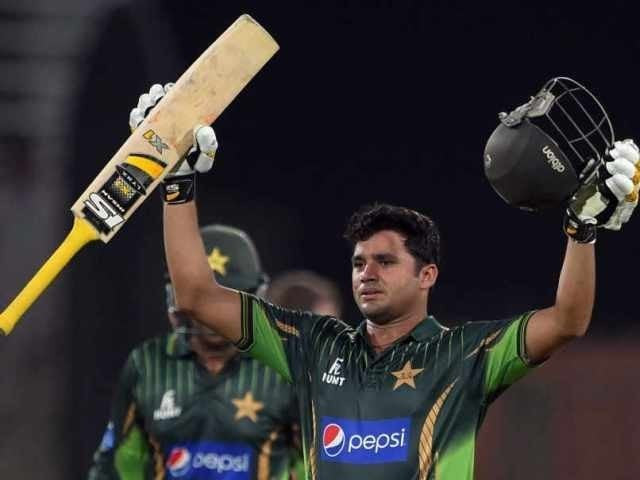The blind leading the blind
Cricket is littered with stories of great captains; larger than life men who transcended their status as players

PHOTO: FILE
Perhaps that is why the captain in football wears a captain’s armband; to distinguish him from the others. In cricket, such is his importance that the captain stands out on his own — no armband required.
In the second ODI against Sri Lanka, Azhar Ali could have done with a captain’s armband. Pakistan could have done with a leader. Neither armband nor leader was to be found; and in the end Dinesh Chandimal simply flicked Rahat Ali off his pads to score the winning runs.
Read: 1st ODI: Azhar Ali believes team knows what to expect from Sri Lanka
Cricket is littered with stories of great captains; larger than life men who transcended their status as players and entered the realm of legends.
Captains like Imran Khan and Steve Waugh — who could drag their teams back from the jaws of defeat, battered and broken, through sheer force of will. Captains like Martin Crowe and Brendon McCullum — so loved and respected that the entire team would go to hell and back for them. Captains like Ricky Ponting and MS Dhoni — who used pressure to their advantage until the opposition could breathe no more.
Legends one and all, yet starkly different in almost every category but one; their ability to lead. As captains they rose in stature until they appeared as giants, refusing to lie down even when all seemed lost.
Early days these may be in his captaincy but it is clear that Azhar is no such man. His intelligence and understanding of the game may well make him one of the best around in years to come but he will never be mentioned alongside the greats.
Read: Warm welcome: Afridi praises Zimbabwe ‘courage’
On Wednesday Azhar showed precisely why. The game was his for the taking; he let it pass by without as much as a fight. He seemed beleaguered, he seemed tired, and most damning of all, he seemed defeated.
Kusal Perrera’s blitz at the start made it clear very early that the only way Pakistan could win this was by taking 10 wickets. Azhar could have done nothing about that innings for the same reason nothing can be done when a mad man runs at you wielding an axe — there just is no way to prepare for it.
But then wickets fell and Pakistan were on top. Pallekele under lights is no batting haven and Sri Lanka suddenly found themselves devoid of all momentum. Azhar made the logic-defying decision of trying to control the flow of runs at a time when the required run-rate was just a shade above five.
Wickets were key but somehow they became the secondary objective. There was no slip in place when his best bowler was bowling to the last recognised batsman and less than 20 runs were required. Chandimal edged it through the vacant cordon. A slip fielder was placed after that, but the chance was already gone, the match had been lost.
Such a defensive approach had never been Pakistan’s modus operandi. They had always been the leather jacket-sporting, bike-riding rebels who played by no one’s rules but theirs. Now they wear sweaters and make calculations before investing in hedge funds because they are the safer bet. They were once the bullies of the playground, now they have their lunch money taken away from them.
The team was defined by its long-haired fast-bowlers, making the batsmen tremble in their boots as they came running up. Now it is defined by part-time spinners bowling the 46th over as an attempt to curb runs when 13 are needed off 30 balls.
Many say the roots of this can be traced back to Azhar’s predecessor — the much-maligned Misbahul Haq. But Misbah was a shrewd man who made do with what he had, and what he had was Saeed Ajmal in his pomp, not a 33-year-old Shoaib Malik.
Malik, incidentally, was around when Pakistan made a remarkable comeback to tie a match against the Islanders in Sharjah. Wasim Akram called the field in when Sri Lanka needed one run with two wickets in hand. Malik picked up the ball and his direct throw dismissed Muttiah Muralitharan before Abdul Razzaq claimed the final wicket to earn the tie. Perhaps, the all-rounder would have been well-served to advise Azhar about how Wasim marshalled his troops that day.
Sri Lanka had needed 23 runs with eight wickets in hand, in the end they couldn’t make it because Wasim didn’t let them. On Wednesday, they needed 92 runs with four wickets in hand, in the end they made it because Azhar let them.
The 30-year-old is still inexperienced and he has been forced to learn on the job. Patience is required and he has shown positive signs of leading from the front — his average since becoming captain stands at 67.
But it is important to call a spade a spade. In the second ODI, Azhar let down his men and his team. That is part and parcel of being a skipper, how he responds now may well define how history remembers him. Follow the leader.



















COMMENTS
Comments are moderated and generally will be posted if they are on-topic and not abusive.
For more information, please see our Comments FAQ